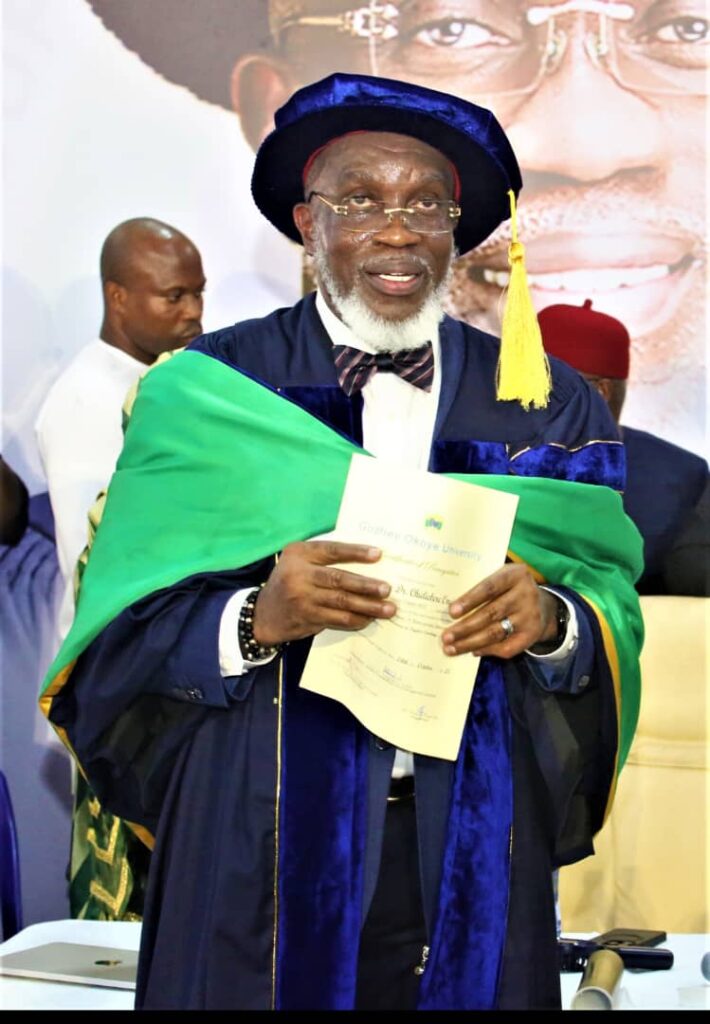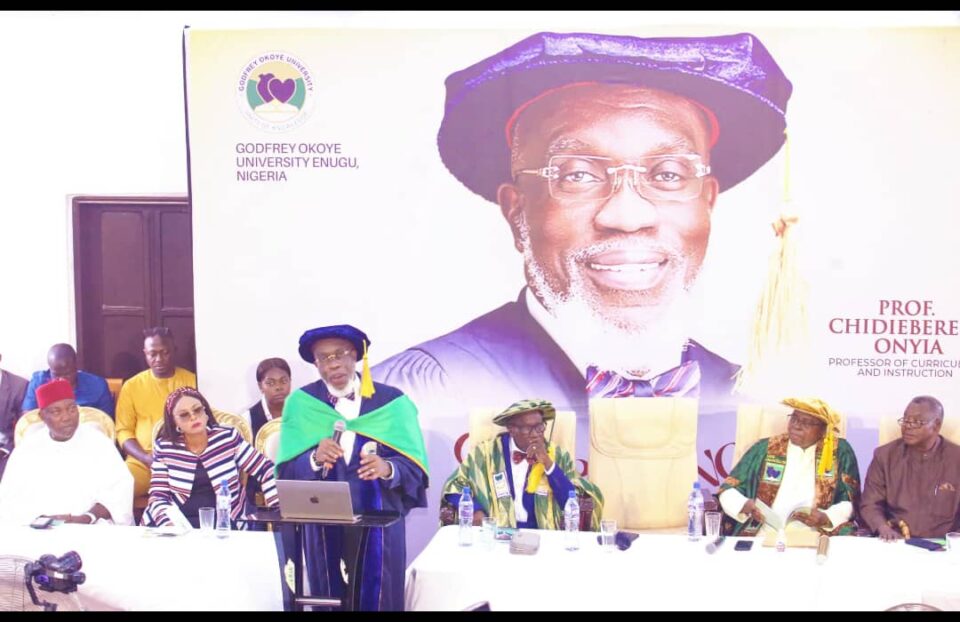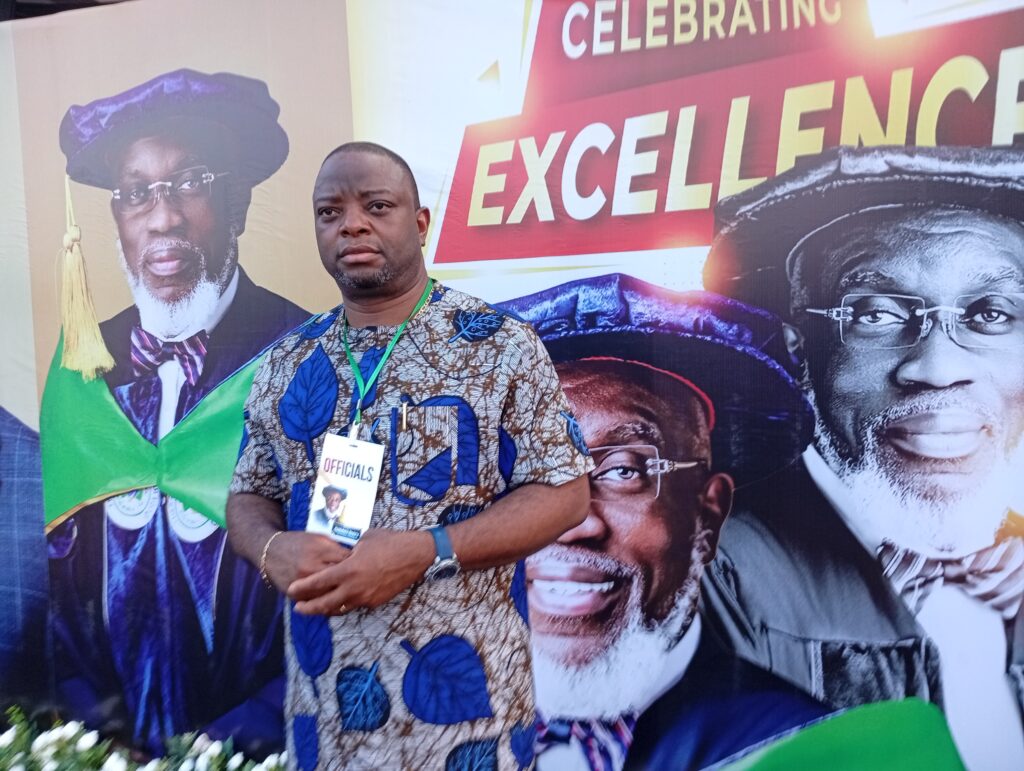….SAYS TECHNOLOGY ALONE CANNOT DRIVE TRUE TRANSFORMATION
By Odomero Igbodo
The Secretary to the Enugu State Government and Professor of Curriculum and Instruction, Professor Chidiebere Onyia, has called for a fundamental rethinking of Nigeria’s educational system, urging policymakers, educators, and administrators to move beyond surface-level reforms and embrace ethical leadership and digital inclusivity as the foundation for genuine transformation.
Professor Onyia made this call while delivering the 19th Public Lecture of Godfrey Okoye University, Enugu, titled “Movement Without Motion: A Retrospective Introspection on Curricular Sedimentation in Digital Ontology.”
In a thought-provoking and data-backed presentation, Onyia described “curricular sedimentation” as the gradual stagnation of education systems that appear to be in motion but lack meaningful progress.
He argued that while technology and digital tools have become dominant in education reform, they often end up reinforcing old problems when not guided by ethical leadership and systemic change.

Drawing from a two-year action research study conducted across nine institutions — including seven federal universities, two teaching hospitals, and education agencies — Professor Onyia said that intentional modeling and public celebration of ethical behavior were proven to create transparency and integrity within institutions.
He criticized what he called the “illusion of legalistic solutions,” where leaders believe stricter rules and punishments can eliminate unethical practices.
“Our findings revealed that rules alone do not reform systems. Once individuals benefit from corrupt practices, naming and shaming no longer deter them,” Onyia explained. “True ethical reform must cultivate a culture beyond compliance — it must build intrinsic motivation for integrity.”
He identified three recurring leadership problems from the research; which include Rhetoric-action gap – where leaders preach ethics but privately enable complicity, Political patronage – where positions are used as rewards for loyalty and fear of inclusivity – where some see transparency and stakeholder participation as threats to their control.
According to Onyia, these issues can only be countered through visible ethical actions, transparent systems, and environments that celebrate integrity rather than punish it.
“When leaders celebrate small ethical wins, it builds confidence. People are encouraged to do the right thing, knowing they will be recognized, not victimized,” he said.
Onyia cautioned that technology without ethical foundations merely digitizes corruption.
“Ethical leadership technology cannot be achieved simply by adding more rules to platforms,” he warned. “Digital systems must be deliberately designed to promote transparency, collaboration, and recognition.”
His team’s findings showed that digital procurement processes — when designed with built-in audit trails and multi-stakeholder review systems — significantly reduce subversion and manipulation.
He revealed that after introducing “ethical treatments” in the study institutions, the willingness to report misconduct increased from 1.8 to nearly 4.0 on a five-point scale, showing a substantial rise in confidence among participants.
“Integrity enhances operational efficiency,” Onyia noted. “Contrary to the belief that transparency slows processes, we found it actually reduces delays caused by corruption and obstruction.”
In what he described as a “critical awakening,” Professor Onyia said teachers who participated in intervention programmes became more open to challenging outdated teaching models.
“Over 15 percent of the teachers exposed to the reform disagreed with traditional methods, compared to less than 1 percent in the control group,” he stated. “This shows that ethical and digital interventions can trigger a mindset shift — the true beginning of transformation.”
He emphasized that genuine reform must move from hierarchical compliance to collaborative agency, where educators collectively challenge entrenched practices and develop reflective, community-based solutions.
The lecture highlighted a meta-framework developed from 20 years of research, identifying four interconnected barriers to education reform such as Systemic Support Deficit, Pedagogical Misalignment, Faculty Capacity Gap and Technological Integration Challenges.
According to Onyia, these challenges reinforce each other, meaning that addressing one without the others leads to a relapse into outdated, lecture-based systems.
He therefore recommended simultaneous, systemic interventions built around two key levers of change by redesigning Curricula for Transdisciplinarity and nsuring Equity and ImpactHe called for integrating local knowledge systems and global challenges into curricula, using digital tools to create modular and flexible learning experiences.
“We must move from isolated disciplines to collaborative hubs where engineering, ethics, and public policy meet to solve real-world problems,” he proposed.
Onyia urged policymakers to ensure that digital reform promotes inclusion rather than automation. He advocated for digital tools that accommodate rural contexts, genuine stakeholder collaboration, and evidence-based evaluation frameworks that measure learning beyond test scores.
“We must use analytics to assess how students apply knowledge to real-life community challenges, not just how they perform in exams,” he stressed.
From Sedimentation to Transformation
In his concluding remarks, Professor Onyia underscored that technology is not a savior without ethical leadership and systemic coherence.
“Digital tools without ethical leadership only make inefficiency look efficient,” he said. “Ethical leadership without digital leverage remains trapped in bureaucracy. And digital reform without a new ontological framework creates a vacuum.”
He described this imbalance as “motion without movement,” urging Nigerian educators and leaders to pursue synchronized reform — combining ethics, technology, and inclusivity to achieve lasting transformation.
“Our task,” he concluded, “is to move from sedimentation to transformation — from mere activity to true progress. Only through ethical leadership, systemic collaboration, and digital inclusivity can we achieve movement that truly matters.”
The Special Adviser to the Enugu State Governor on Legal Matters, Hon. Osinachi Nnajieze, commended the Secretary to the State Government (SSG), Professor Chidiebere Onyia, for delivering what he described as a profound and thought-provoking inaugural lecture that connects education to the broader goals of societal development.
Speaking shortly after the event, Hon. Nnajieze, who is also a legal practitioner, said Professor Onyia’s lecture demonstrated a deep understanding of how curriculum design and implementation should be anchored on the aspirations of society.
“I am a lawyer, so when you talk about retrospect and introspect, you know you are comparing and relating the past with the future through reflection. And that’s what he has done here today on curriculum—how it is designed, how it is implemented, and how it should be driven by the ultimate goal of the society. Where the society wants to be should be reflected in what students are being taught,” Nnajieze explained.
He emphasized that the intended learning outcomes of every teaching programme must align with the vision and goals of the society, noting that such an approach forms the philosophical and intellectual foundation for national growth and behavioural development.
“That is apt. It connects to all the problems of this country. It’s about how the foundation we lay for the philosophical, intellectual, and behavioural upbringing of children—and even adults in the university—should be,” he added.
Nnajieze further linked Professor Onyia’s lecture to the development agenda of Governor Peter Mbah, stating that the SSG plays a pivotal role in ensuring the Governor’s policies are effectively implemented.
“Again, that links up to what we are doing in Enugu State, which the SSG himself proposed. It is at the heartbeat of the Governor’s agenda—driving and steering it in the right direction. The SSG holds the delivery units of the Governor together and ensures that what the Governor wants done is delivered to the letter,” he said.
Commending Professor Onyia’s leadership and intellectual depth, Nnajieze described him as a key pillar in the Mbah administration.
“It’s wonderful seeing that he understands and has the theoretical underpinning of the things he is doing—administratively, politically, and in managing the Governor’s team. He’s someone I met when I got into this job, and he has proved himself in every sense. The way he leads, the way he holds people accountable, the way he drives the agenda—it’s almost as if he was with the Governor when the vision for the State was conceived. The fact that he understands it so well says a lot about him,” Nnajieze concluded.
Many described Professor Onyia’s lecture as a “wake-up call” to confront the deep-seated stagnation in Nigeria’s education system and to champion reforms that are both ethical and innovative.
The 19th Public Lecture at Godfrey Okoye University drew academics, policymakers, education advocates, and traditional leaders from across the country.


